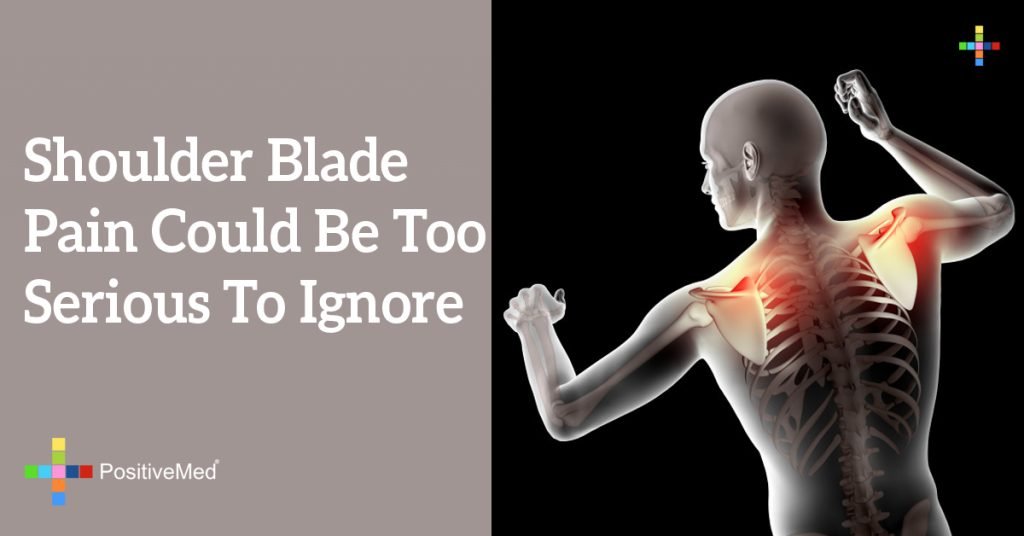
Shoulder Blade Pain Could be Too Serious to Ignore
If you’re experiencing pain between your shoulder blades, you no doubt know just how inconvenient and unpleasant that sensation can be. It can prevent you from performing the physical tasks you normally would limit your ability to work and play with your kids and even have a profoundly negative effect on your mood in the long term. It can be easy to chalk this pain up to the common issue of minor back strain and pop a few over the counter anti-inflammatory tablets when it gets too bad, but the truth of the matter is that pain between the shoulder blades can actually be far more serious.

Image Via: ehealthstar.com
There are correlations relating pain between the shoulder blades to several major types of cancer, including:
- esophageal cancer
- lung cancer
- liver cancer
These are serious, life-threatening disorders. Like all cancers, the longer these three diseases progress without treatment, the worse the long-term prognosis becomes. This is why it’s critical not to ignore pain between your shoulder blades. Let’s take a closer look at these three serious illnesses, their risk factors and their other symptoms.
Esophageal Cancer

Your esophagus is an extremely important part of your digestive tract. It is the tube through which food passes on its way to your stomach after consumption. The health of the esophagus is directly relative to your ease in eating, swallowing and digesting your food. When a patient presents with esophageal cancer, a treatment plan must be developed quickly. A study performed by the Association of American Family Physicians linked upper back pain to the condition. Some risk factors for an esophageal cancer diagnosis include:
- Smoking cigarettes or cigars
- Heavy consumption of alcoholic beverages
- Obesity
- Existing issues with GERD
- A diet lacking in key nutrition provided by vegetables and fruits
- A complication of GERD called Barrett’s Esophagus
Other symptoms experienced by people suffering from esophageal cancer include:
- Difficulty swallowing
- Pain in the center of the chest
- Unintended weight loss
- A hoarse voice or chronic coughing
- Emesis
- Chronic hiccuping
- Pain in the bones
- Black stools, indicating the passing of blood
RELATED ARTICLE: Reduce the Risk for Lung Cancer by 44% by Eating THIS
Lung Cancer
One of the most prevalent cancers seen and treated by physicians, lung cancer happens when a mass of cancerous cells grows in or metastasizes to the lungs.
Lungs are quite obviously a crucial part of human survival, and preserving as much healthy tissue as possible is always the end goal of a surgeon when treating the cancer. A clinical presentation on small cell lung cancer linked back pain to the disease. Risk factors for lung cancer include:
- Smoking tobacco or being around tobacco smoke
- Being exposed to radon in older buildings that aren’t being monitored – basements have a particularly high risk of excess radon
- Asbestos exposure, which can happen in certain jobs in which dangerous insulation materials are processed or handled
- Exposure to uranium, mustard gas, coal byproducts, chromium, nickel, silica, vinyl chloride, arsenic, cadmium, beryllium and diesel exhaust fumes
Additional symptoms experienced by patients with lung cancer include:
- Pain in the rib cage area
- Coughing up blood or phlegm or experiencing a chronic dry cough
- Exhaustion, appetite reduction, feeling weak
- Chronic lung infections, inability to breathe normally
- Swelling of lymph nodes
Liver Cancer
Your liver is your body’s primary agent for detoxification. Together with the kidneys, it filters the blood and fluids in your body.It also produces bile, an essential element in the digestion of lipids, which is stored in the gallbladder until your body needs it. Without a functioning liver, a patient will die. This is why patients with liver cancer are often on a transplant list and receiving dialysis, a treatment in which the blood is slowly taken out of the body, filtered externally and replaced. Some risk factors for liver cancer include:
- Hepatitis B and Hepatitis C infections
- Cirrhosis of the liver, often caused by chronic alcoholism
- Inherited diseases of the liver, including Wilson’s Disease and hemochromatosis
- Blood sugar disorders such as diabetes
- Obesity
- Exposure to toxins created by mold on poorly stored crops (this risk factor is less prevalent in the USA, mainly being seen in Asia and Africa)
Other symptoms experienced by patients with liver cancer include:
- Generalized stomach pain, including bloating, nausea and emesis
- Exhaustion, limited appetite, unintended weight loss
- Yellowing of the skin or eyes, known as jaundice
How To Proceed
If you’re experiencing pain between your shoulder blades in conjunction with any of the risk factors and symptoms presented here, it’s best to make an appointment with your doctor to be evaluated as soon as you can. Your doctor will be able to advise you on how to proceed in the event of a cancer diagnosis. Waiting is never the answer if cancer is suspected, as once any of these cancers advance to their fourth state, a terminal diagnosis is likely. If you suspect you may have cancer, seek medical intervention as soon as possible.
Naturally Treating Upper Back Pain
If you’re fortunate enough to have a clean bill of health aside from the aching between your shoulder blades, natural remedies such as gentle stretching and a diet rich in naturally anti-inflammatory foods is key to offering relief. Foods such as dark greens, almonds, lean protein are helpful, while refined carbohydrates, saturated fats and sugars should be avoided. Upper back pain is often caused by poor posture, so try sitting up straight, standing up straight and sleeping on your side with your knees drawn up to your chest to aid in providing long term relief.
Not all upper back pain is related to cancer, but the correlations are significant enough that they should not be ignored. Visit your doctor to rule out any abnormalities, and once you have, proceed with a healthy diet, light stretching and ergonomically sound body positioning in order to get rid of unpleasant upper back pain once and for all.





